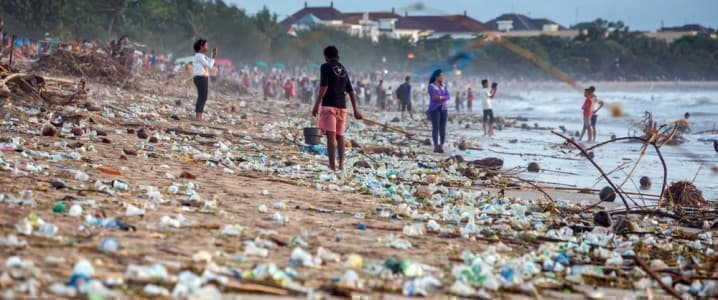Just about anywhere you travel in the world, you will encounter plastic pollution. Even the beaches of remote tropical islands are littered with plastic waste. A recent study published in the journal Nature characterized 414 million pieces of plastic — 238 metric tons — on one remote island chain in the Indian Ocean. The study’s lead author, Jennifer Lavers from the University of Tasmania’s Institute of Marine and Antarctic Studies, said this is an indicator of the staggering amount of plastic debris floating in the oceans:
“Islands such as these are like canaries in a coal mine and it’s increasingly urgent that we act on the warnings they are giving us. Plastic pollution is now ubiquitous in our oceans, and remote islands are an ideal place to get an objective view of the volume of plastic debris now circling the globe.”
Many are familiar with the Great Pacific Garbage Patch, which is a collection of several large areas of marine debris in the North Pacific Ocean. The total area of this garbage patch — consisting largely of plastic debris — covers an area that is estimated to be twice the size of Texas. The patch consists of more than 1.8 trillion pieces of plastic with an estimated weight of 80,000 metric tons, and it poses a serious threat to marine life such as whales, sea turtles, fish, and birds.
Remote plastic dumps may be out of sight for most people, but they nevertheless impact the health of humans everywhere. Plastics break down in the environment, and their degradation products, such as bisphenol A (BPA), are known to interfere with human hormonal function. Researchers are even finding microplastics in human organs.
But why should plastic pollution be such a serious environmental threat? Don’t we recycle our plastics?
It is true that many of us place our plastics in recycle bins. We assume that it gets sorted and reused. But much of that “recycled plastic” nevertheless ends up in landfills.
The problem, in a nutshell, is that used plastics just don’t have much value. It is cheaper in most cases to source new plastics than to recycle them. But there are two things that can change that dynamic: Global legislation to address plastic pollution, and new technologies aimed at recycling and repurposing used plastics.
Related: WTI Crude Oil Price Hits 7-Year High
A growing number of community and conservation organizations have urged President Joe Biden to take executive action to address the plastic pollution crisis. A Los Angeles Times editorial also urged President Biden to take the lead on pushing for a global treaty within the Group of Seven (G7) countries.
Support is growing for a global treaty on plastic pollution, such as the Paris Climate Agreement that is aimed at curbing carbon emissions. More than two-thirds of UN member states, and the EU, have stated that they are open to an agreement on plastic pollution.
Climate treaties have driven innovation in the area of reducing carbon emissions. Plastic pollution treaties could do the same for the manufacture, use, and reuse of plastics.
In the next article, I will discuss some of the technical challenges of dealing with used plastics, as well as one Canadian company that has taken an innovative approach to the problem.
By Robert Rapier via rrapier.com
More Top Reads from Oilprice.com:
- High Natural Gas Prices Could Lead To 2 Million Bpd Extra Oil Demand
- Is America Doomed To Replicate Europe’s Energy Crisis?
- A Cold Winter Could Send Oil Prices Soaring Past $100


















